Stefan Zweig's alligator shoes epitomize for me the element of dandified glamor in his character. For this reason, they also evoke the optimistic heyday of the Austrian cultural renaissance, when it seemed possible that the epicurean good life and inspiring artistic achievement might perfectly align. Klaus Mann, the son of author Thomas Mann and a close friend of Zweig's, noted "something bland and iridescent, seducible and seductive, a Casanova-like charm in Zweig's persona" that struck him as typically Viennese. For all that Zweig sought to model his intellectual persona on the Sixteenth Century humanist scholar Erasmus -- embodying high-minded loyalty and unselfish service to the spirit in the name of conscientious tolerance -- Mann felt there was something conspicuously absent from this self-portrait. Zweig's fusion of "French suavity with a touch of German pensiveness and a faint tinge of Oriental eccentricity" gave him away as a product of Vienna, not Rotterdam, Mann wrote. When Zweig was a young man the rooms of his bachelor flat in that city were lined with countless serious books; but the walls behind these volumes were colored a dazzling, opulent scarlet. He was known for sprinkling flakes of gold leaf into the liqueurs he served his eager guests, with whom he spoke passionately about the artist's obligation to explore the kaleidoscopic variety of humanity.
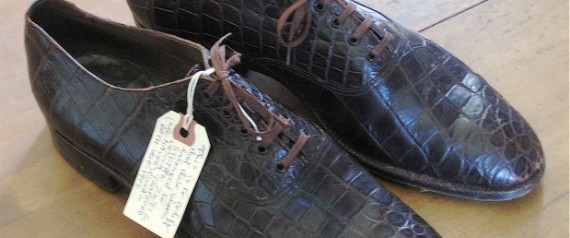
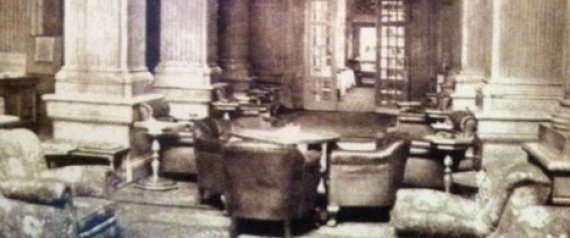
Interior of the Hotel Imperial, attached to the Café Imperial, one of Stefan Zweig's favorite Viennese coffeehouses.
Zweig's reputation as a consummate host grew only more beguiling over the years. In the 1920s, when he lived in a bright yellow chateau that had once been an Archbishop's hunting lodge on the Kapuzinerberg, a hill overlooking Salzburg, Zweig was visited by many of the greatest artists, musicians and intellectuals of the age. The lively conversations that he orchestrated on the house's leafy terrace, and in rooms decorated with Dufour wallpaper depicting a panorama of geographical scenes, proved so inviting that their appeal trumped political antipathies. As Zweig's first wife Friderike later wrote, the signatures in the guest book he kept (later burnt by the Nazis) revealed the striking diversity of the individuals who'd been enticed to assemble there. The "exotic script of several pacifist minded Chinese, Hindu and Japanese women," fresh from a summer congress of the International League for Peace and Freedom, could be found near the autographs of "revolutionary hotspurs," which, in turn, were scrawled alongside the flourishes of archdukes and princes. Zweig's home presented a kind of enchanting miniature of the cosmopolitan utopia he longed to nurture into being across the Continent. A celestial globe adorned the house's grand hall, Friderike noted, "vainly awaiting its terrestrial counterpart."
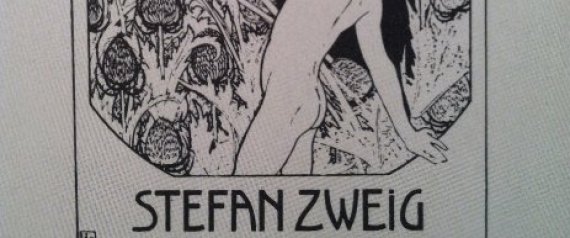
Stefan Zweig's bookplate in the early years of his writing career
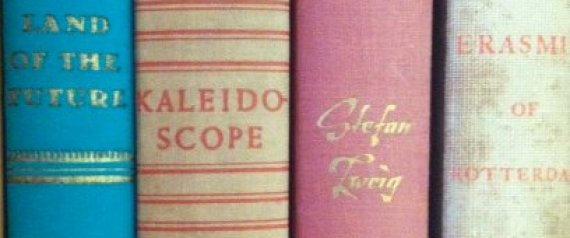
Kaleidoscope is a volume of Zweig's short stories and novellas published by Viking Press in 1934, the year Stefan Zweig went into exile.
The French psychoanalyst Charles Baudouin was one of Zweig's guests in that post-War era when a new Pan-European rapport seemed possible, and he marveled at the generosity of Zweig's hospitality then. "It envelopes without embarrassing," he wrote. "A cordial warmth emanates from this person with so moderated an ardor, as he darts from one group to another, with a light and easy step in which there is something of the dancer, of the Mercury." As Baudouin describes Zweig's social persona, in which Zweig spun between "little planetary systems" of guests, casting on everyone "a warm, velvet-like glance," it's tempting to picture him sporting his stylish footwear. Zweig appeared to his visitors at the time "a being of communication and of communion." The fluid grace of his manner helped to make everything seem possible, not just social harmony but political concord as well. Yet in his memoir, The World of Yesterday, Zweig noted the haunting irony that his house in Salzburg lay near enough to the German border that with the naked eye it was possible to see the very spot on the face of the Berchtesgaden mountain where Hitler built his "Bird's Nest" retreat, in which he plotted the end of Austria and the destruction of the mongrel civilization it represented. Zweig didn't mention, though of course this was true also, as I saw on one of my research trips for the book, that the location of Zweig's home was equally visible from Hitler's more elevated perch. These two antithetical figures were literally in each other's sight lines.
In addition to conjuring the social dance at home in Austria, Zweig's alligator shoes also evoke Zweig's flamboyant globe-trotting--the many years when he was known for tirelessly hopscotching between cities and watering holes all around the Continent. Zweig's addiction to travel was so pronounced that friends dubbed him the "Flying Dutchman." The urge to travel doesn't arise only from love of far-away places, Zweig once declared. "We also want to leave our own area behind, our domestic world so well regulated day to day; we are drawn by the desire no longer to be at home and therefore no longer to be ourselves. We want to interrupt a life where we merely exist, in order to live more." While Zweig's was known for cutting a dashing figure wherever he went (on his first trip to Brazil he wrote of being so idolized that for "six to eight days I have been Marlene Dietrich"), there was a larger philosophical intent behind his roaming. It was bound up both with his commitment to undermining jingoistic cultural assumptions, and to the imperative of self-discovery. This is why Zweig so deplored the rise of the modern, pre-packaged travel industry, which minimized the opportunity for authentic discoveries. To convey the loss, he coined a term that stressed the passivity of mass tourism. "One no longer travels, one is travelled," he wrote. And in this state, one surrendered that "whiff of danger and adventure, a breath of capricious chance and engrossing precariousness" which had always before surrounded the wanderer's pursuit. Travel, Zweig opined, "must be an extravagance... it must represent the most intimate and original form of our taste." Especially in an era marked by the ever more stringent regulation of life, travel had to be defended against the fashion for "bureaucratic displacement." By traveling in the manner of our ancestors, which involved "a sacrifice to the rules of chance," one had the opportunity of discovering "not only the exterior world but also that which lies within us."
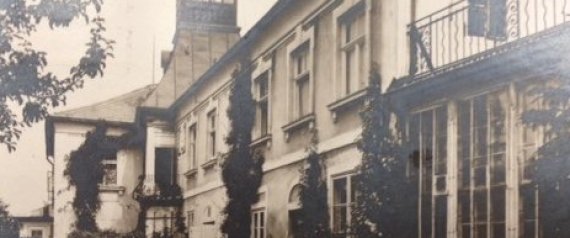
Stefan Zweig's house in Salzburg at the time he lived there.

From a point just beyond Stefan Zweig's house looking toward Hitler's Bird's Nest
Along with these more high-minded aims, there's no question but that Zweig was simply happiest and most able to project a holiday spirit to everyone in his radius when he was on the road. On one of his last trips to Italy, in May of 1932, Zweig wrote rapturous letter after letter, describing the delights of Florence, even though the European political situation was already in free-fall. "Splendid weather, the women and men so beautiful in the springtime, it makes you want to whinny for joy," he wrote in one note. "The air tastes of mignonette and great quantities of flowers are for sale in the street," he wrote in another. He was refusing social engagements right and left he declared in a third, having proven himself such a star that when he finally lectured at "the divine hall of the Signoria," the place was "packed to bursting, over a thousand people and no Germans, only Italians, and what incredible women! --grand événement artistique, and afterward I had to autograph some two hundred books, ward off invitations from the Podestà and all imaginable kinds of Marquises and Principessas." Zweig's sheer zest for travel is infectious here; I'm betting he hardly ever took off his alligator shoes that trip.
Even after Zweig had gone into exile in England in 1934, distinguished refugees continued to seek him out at the cafes he haunted around Piccadilly Circus not just for the practical help he liberally proffered, but for the ways he embodied lost dreams. As late as 1936, the writer Irmgard Keun described Zweig's appearance with his graceful secretary, (and future wife) Lotte at his side as personifying the film buff's fantasy of a celebrity writer: "worldly, elegant, well-cared-for, with a gentle melancholy" in his famously black eyes. He carried around with him the aura of the "castle" he'd left behind in Salzburg, Keun wrote.
On rare occasions, such as for a gala performance of an opera at Covent Garden, Zweig would still slip on fancy dress in those days; indeed, he never lost his taste for exquisitely tailored suits. But when Zweig left his home in Bath, England in the summer of 1940 to sail for New York on what would prove his last Atlantic crossing, he left his alligator shoes behind. He abandoned of course many more important things as well, including the vast bulk of his library numbering over 10,000 books, and his world-class collection of manuscripts and musical scores. But those shoes were far more portable, and the fact that they no longer found a place in his luggage seems a poignant renunciation. At the time, Zweig still spoke of returning to Europe after a lecture tour in South America. However the fall of France that past spring had been a kind of deathblow to Zweig's hopes for the restoration of his European idyll. Desmond Flowers, his British publisher was with Zweig when news broke that the swastika was flying over the Eiffel Tower, and said that he'd never seen a man so completely shattered. Zweig, he wrote, "shrank into himself like a mummy and could not speak."
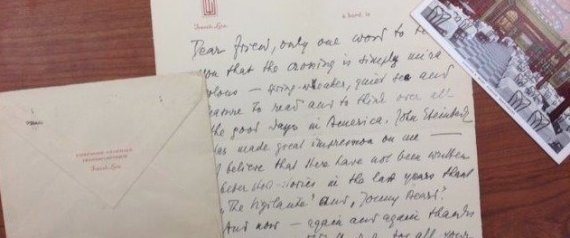
Letters and cards by Stefan Zweig, the "Flying Dutchman"
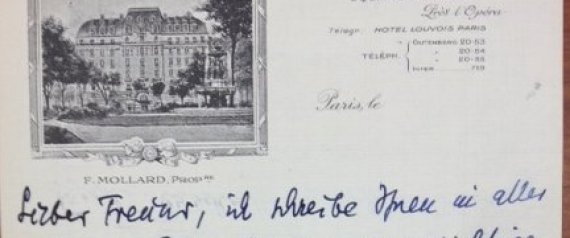
Hotel Louvois
By the time Zweig decided to leave England, he felt himself compelled to a perpetual nomadism. "Formerly writer, now expert in visas," he described himself in one letter. And though he assured some friends in Europe that he'd back with them by October, he told others that things looked so wretched "a well-aimed torpedo-shot would to my mind be the best solution."
Ultimately, Zweig's investment in the accouterments of high style had roots in both his conception of his artistic muse and his commitment to deeper forms of social engagement. In one of his last letters he wrote his friend the French writer and ambassador of letters Jules Romains, "All I have been able to give was thanks to a certain interior élan. I could seize the imagination because I was seized myself...Without faith, without enthusiasm, reduced to the sole power of my brain, I walk as though on crutches."
The unique aura of sensuous enchantment Vienna carried at the hour of its cultural apogee is something we can experience glimmers of when we reread Zweig's work today. And Zweig's own argument for the deeper significance that enchantment carried remains intriguing. When he was in Paris for the last time, in April of 1940, Zweig delivered a lecture entitled "The Vienna of Yesterday" that became the seed for his memoir. In this talk he invoked the long German tradition of deriding the Viennese for their spirit of 'jouissance'. For two hundred years, Zweig declared, they blamed us "because we liked the good things of life so much." The Germans viewed Vienna as nothing less than "the Falstaff of cities." And it was true, he acknowledged, the Viennese reveled in amusements and pleasures of every variety. But rather than trying to deny the accuracy of this reputation among the Viennese, Zweig announced that he would defend it. "I believe the good things in life exist so one might profit from them and it is the supreme right of every man to live freely, without anxieties, without longing." The real problem as he saw it manifested in the Germany of 1940 was not glamor or languor, but the way that a surfeit of industrious, frenetic ambition trampled over the most precious values of humanity. "Vienna's "old adage 'live and let live,' is not only humane but far wiser than all the severe maxims," he wrote.
Finally, the spirit of mutual tolerance Zweig idealized was bound up with a celebratory appetite for erotic pleasures and aesthetic delights that found expression in everything from great music to colorful haberdashery. He saw the particular Viennese spirit of jouissance as having played a role nurturing all those great aesthetic creations and scientific discoveries that still cast a spell over us as we gaze back at Stefan Zweig's Vienna of Yesterday.